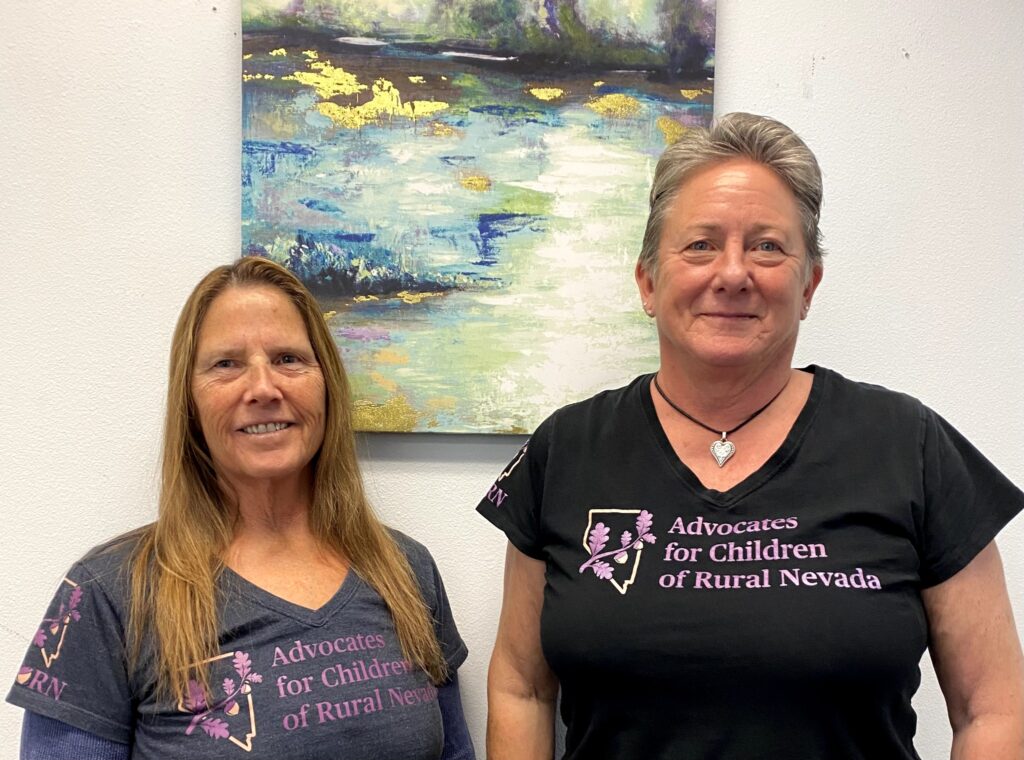Advocating for vulnerable children in foster care, Advocates for Children of Rural Nevada (ACORN) has become a beacon of hope under the leadership of Executive Director Kathie McKenna. Operating in Nye and Esmeralda counties, ACORN focuses on providing a voice for children caught in difficult circumstances. Originally established as Pioneer Territory CASA, the organization rebranded in 2023 to align more closely with Nevada state regulations while maintaining its core mission. “The mission has not changed,” Kathie emphasized. “We are still here to advocate for children in the foster care system.”
ACORN’s work begins when children are removed from their homes due to neglect or abuse. After the Nevada Division of Child and Family Services (DCFS) places children into protective custody, they must appear before a judge within 72 hours. If the judge agrees with the removal, ACORN steps in. “That’s where we come in,” Kathie explained. “We attend the hearing to understand the circumstances and prepare to advocate for the children’s best interests.”
ACORN’s advocates are assigned to cases where they collaborate with social workers, attorneys, and foster families to ensure the needs of the child are met. Kathie described their critical role, saying, “The attorney represents the child’s voice, but our advocates represent the child’s best interests. Sometimes a child may want to go home, but if the parent hasn’t addressed the issues that caused the removal, it may not be in the child’s best interest.” Advocates must communicate these nuanced perspectives to the court, ensuring that every decision prioritizes the child’s welfare.
Despite ACORN’s dedication, there are challenges. “We’re close, but we don’t have enough advocates for all the children,” Kathie admitted. Until an advocate becomes available, Kathie and Julie Schmidt, the organization’s other staff member, stay involved in each case. Their commitment ensures that no child is without representation during critical moments.

Kathie shared a personal connection with one of her long-term cases. “I’ve had the same case for five years. She came into care at nine years old and will turn 14 soon. We’ve built a bond that feels like a grandparent-grandchild relationship,” she said. For children who experience frequent changes in social workers, ACORN provides a constant, stable presence. “She has my cell number and can call me anytime. That consistency is crucial.”
The organization’s impact is clear. Research indicates that children with an advocate are more likely to achieve permanency—whether through reunification with their family, adoption, or guardianship—in less time than those without. Kathie highlighted this as a key measure of ACORN’s success. “The time children spend in custody is shorter, and their outcomes are more permanent. That’s what we’re working for.”
Becoming an advocate requires commitment, including 32–40 hours of training and a clean background check. “But the most important qualification is a genuine love for children,” Kathie said. Advocates come from all walks of life, ranging from retirees to students (advocates must be at least 21 years old). Kathie is particularly excited about an upcoming training class featuring a significant number of male participants. “We need male advocates, especially for teenage boys. This is a step in the right direction,” she noted.
For those unable to fully commit, ACORN offers flexibility. Peer coordinators assist with court reports and case management, ensuring that all advocates have the support they need. “Whether it’s working professionals or retirees traveling during the summer, we have ways to make it work,” Kathie explained.
To sustain its operations, ACORN relies heavily on community support through fundraising events. The annual Luau in September and Crab Fest in February are vital sources of funding. The Luau, held at the Calvada Eye, features Hawaiian dance performances, auctions, and raffles. “It’s a beautiful event with amazing performances by the Rau Tamanui dance troupe,” Kathie said. The Crab Fest, a sellout event each year, serves fresh Dungeness crab flown in from the Northwest. “We process over 600 pounds of crab for this event,” Kathie shared. “It’s a lot of work, but it’s worth it.”
Fundraisers not only generate revenue but also foster community engagement. Kathie acknowledged the importance of local participation. “Without attendees, we couldn’t host these events. Their support is what keeps us going,” she said. Proceeds help fund operational costs and provide holiday gifts for foster children, ensuring they feel valued and loved.
ACORN faces ongoing challenges, particularly in securing consistent funding and recruiting volunteers. Grant funding, which comprises a significant portion of their budget, has declined sharply in recent years. “We’re receiving about half of what we did five years ago, and it’s expected to drop further next year,” Kathie revealed. To address this, ACORN has expanded its fundraising efforts, including raffling a Hawaii vacation donated by Kathie herself. “Every dollar raised goes directly to supporting our mission,” she said.
Looking to the future, Kathie has a clear vision: “Our goal is to have an advocate for every set of siblings in foster care. Every child deserves a voice in court and someone who is there solely for them.” This vision also includes addressing the lack of local foster families, which often forces children to be placed in distant cities like Reno or Las Vegas. “While we use tools like video calls to stay connected, nothing replaces in-person interaction,” Kathie explained.
Kathie’s leadership and ACORN’s dedicated volunteers continue to make a meaningful difference for foster children in rural Nevada. “Every child deserves stability, advocacy, and a chance at a better future,” she said. For those interested in supporting ACORN, donations can be made through their website, or you can get involved by attending their next fundraiser. With the community’s help, ACORN is ensuring that no child in foster care is forgotten.




